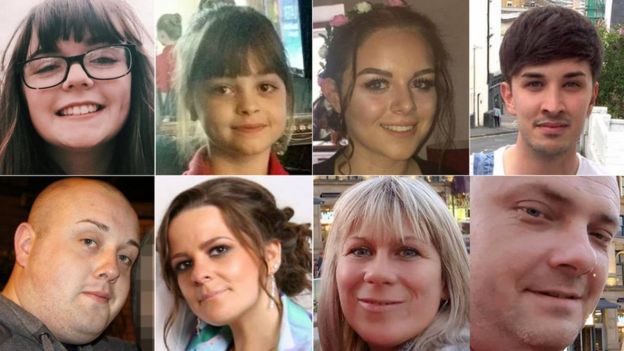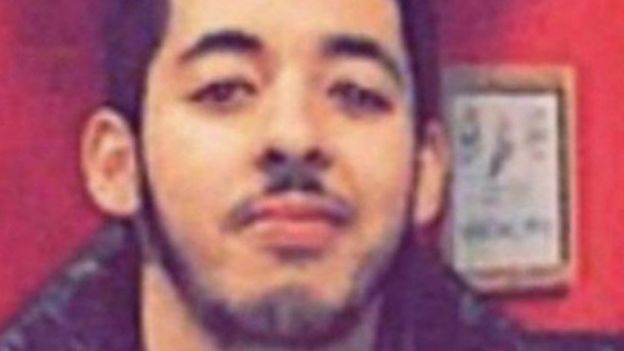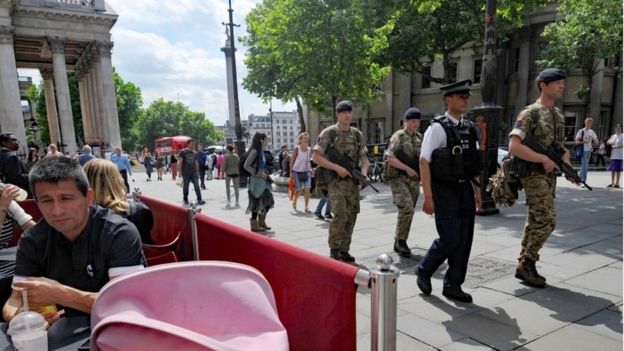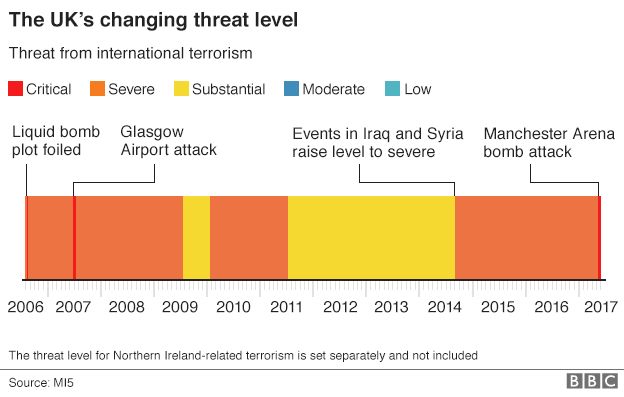Follow NaijaDays on Twitter
Follow @naijadays
A fifth man has been arrested in the UK over Monday's bombing at a pop concert at Manchester Arena, as police said they were investigating a "network".
Suicide bomber Salman Abedi killed 22 - including children - and injured 64 outside an Ariana Grande gig.
The UK terror threat level is now at its highest level of "critical", meaning more attacks may be imminent.
Police said the fifth man, who was arrested in Wigan, had been carrying a package which is now being "assessed".
Eyewitness Connor Britton told the BBC the man had been held by "undercover armed police".
He said workers in his office had been told to stay inside and lock their windows, and that a red package had been "moved to a clear part of the street".
Meanwhile, military personnel are being deployed to protect key sites after the terror threat level was raised.
Home Secretary Amber Rudd said: "[Monday's attack] was more sophisticated than some of the attacks we've seen before, and it seems likely - possible - that [Abedi] wasn't doing this on his own."
BBC security correspondent Frank Gardner said that the bomber is thought to have been a "mule", using a device built by someone else.
In other developments:
- A minute's silence will be held at 11:00 BST on Thursday in remembrance of those who lost their lives or were affected by the attack, the government has announced
- The Conservatives and Labour will resume local general election campaigning on Thursday, and national campaigning on Friday
- A silence will be held before the FA Cup final between Arsenal and Chelsea on Saturday, with a wreath laid by FA president Prince William.
What's happening with the investigation?
Five people have been arrested in the UK since Monday night, including Abedi's older brother Ismael who was detained in Chorlton, south Manchester, on Tuesday.
Abedi's younger brother, Hashem, was arrested in the Libyan capital of Tripoli on Tuesday on suspicion of links to so-called Islamic State, a local counter-terrorism spokesman told Reuters news agency.
Before news of the Tripoli arrest emerged, Greater Manchester Chief Constable Ian Hopkins said on Wednesday: "I think it's very clear that this is a network that we are investigating.
"And as I've said, it continues at a pace. There's extensive investigations going on and activity taking place across Greater Manchester, as we speak."
Police also raided a block of flats near Manchester Piccadilly station in the city centre, requiring them to carry out a controlled explosion and briefly close the railway line.
Anyone with information about the attack can call the anti-terror hotline on 0800 789321.
Who are the victims?

The victims include 14-year-old Sorrell Leczkowski, from Leeds, whose grandmother is critically injured in hospital.
Others who died are mother-of-three Michelle Kiss, Nell Jones, 14, eight-year-oldSaffie Roussos, Alison Howe, Lisa Lees, Jane Tweddle-Taylor, 51, Martyn Hett, 29, and Olivia Campbell, 15.
Kelly Brewster, 32, John Atkinson, 28, Georgina Callander - thought to be 18 - and Marcin and Angelika Klis, a Polish couple from York, have also been named.
Some of the victims had been making their way outside at the end of the gig when Abedi detonated his "nuts-and-bolts" bomb.
Others had been waiting in the foyer to pick up children and family when it went off.
A serving Cheshire police officer - off-duty at the time - was also among those killed. She has not yet been named.
The BBC understands her husband is critically ill and her two children were injured.
Of the 64 injured, 20 are in a critical condition. Twelve of them are children.
Mr Hopkins said the families of all those injured had been contacted. Due to the number of victims, post-mortem examinations were likely to take between four and five days, he added.
A hotline has been set up for people concerned about loved ones - 0800 096 0095.
Who was the attacker?

Salman Abedi is understood to be a 22-year-old born in Manchester to Libyan parents, and a former University of Salford student.
He attended Burnage Academy for Boys in Manchester between 2009-11, and The Manchester College until 2013.
Hamid El-Said, who worked for the UN on tackling radicalisation and now works at Manchester Metropolitan University, said Abedi had a "really bad relationship" with his family and his parents had tried but failed to keep him on the "right path".
"Eventually he was doing very bad at his university, at his education, and he didn't complete, and they tried to take him back to Libya several times. He had difficulties adjusting to European lifestyle," he said.
A former classmate of Abedi's told the BBC that he was a "very jokey lad" but also "very short tempered" and would get angry at "the littlest thing".
The man, who did not want to be identified, said Abedi was "away at random times throughout the year".
He did not know if Abedi was abroad or playing truant because he hung around "the wrong crowd and was very, very gullible".
The man said that, before leaving the school in 2011, Abedi became "more and more religious" and that this might explain why he cut ties with former classmates.
A Muslim community worker, who did not want to be identified, has told the BBC that two people who knew Abedi at college had made separate calls to a hotline to warn the police about his extremist views.
He said they had been worried that Abedi was "supporting terrorism" and had expressed the view that "being a suicide bomber was ok".
The friends had argued with him, telling him he was wrong but had become so concerned they contacted the police, the community worker said.
The calls are thought to have been made five years ago, he added.
What does a 'critical' threat level mean?
 |
| Soldiers join police officers patrolling in London |
Prime Minister Theresa May said soldiers are being placed at Buckingham Palace, Downing Street, embassies and the Palace of Westminster to support armed police in protecting the public.
Military personnel may also be seen at other events over the coming weeks, such as concerts, Mrs May said, in what she is calling a "proportionate and sensible response".
Home Secretary Amber Rudd said 984 troops had been deployed in the first instance. Up to 3,800 are available.
She said she expected the raising of the threat level to critical to be temporary, adding that the bomber had been known "up to a point" by the intelligence services.
The highest threat level has only been reached twice before: in 2006 during an operation to stop a plot to blow up transatlantic airliners, and a year later when security chiefs were hunting for the men who tried to bomb a London nightclub and attacked Glasgow Airport.

The Metropolitan Police says it has increased its presence across London.
The Palace of Westminster has been closed to the public following police advice, and will not re-open until further notice, its website said.
Chelsea Football Club have cancelled their Premier League victory parade, due to take place in London on Sunday.
Elsewhere, extra police officers have been deployed at key sites and on transport networks in Northern Ireland. Police Scotland are reviewing security at major events, including the Scottish Cup Final.






No comments:
Post a Comment